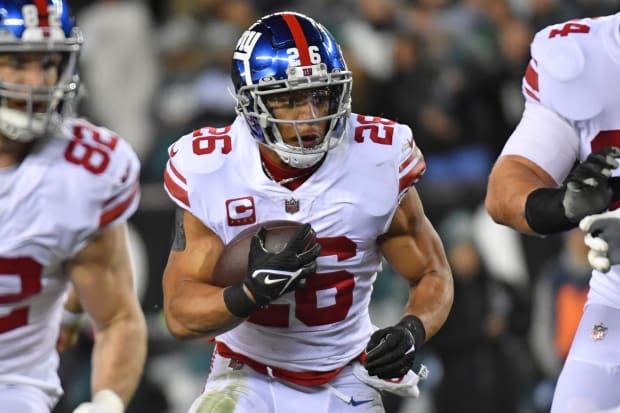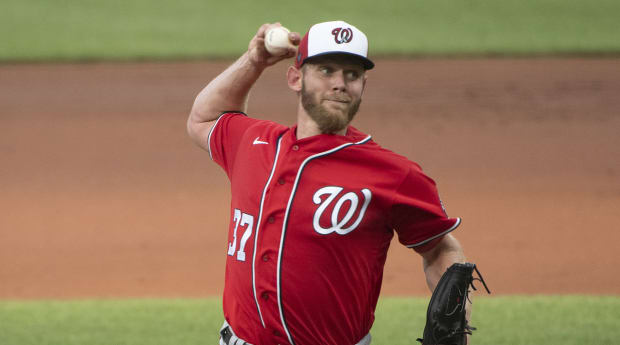Saquon Barkley will surely provide us with plenty of fun moments this season, though none quite as entertaining as when he said recently that he might sit out 2023 in a contract dispute. “That’s a play I could use,” Barkley told the Money Matters podcast, in the way that a coach might describe a fake punt flea-flicker in which all of his linemen stop blocking and do the Griddy, or a poker player might bluff by casually mentioning he is holding five aces.
Barkley was obviously never going to skip the season. That was just something to say during contract negotiations. Now that he has agreed to a one-year deal with the Giants—a deal that is better than the franchise tag by just enough for Barkley to claim he won something—it will be up to some other running back to try to break the system.
It would be fun to see one try. The player might even succeed, as long as the right running back uses the right tactics to do it. I believe those tactics exist. I’m just not sure what they are.
Conor Orr: The Giants Won the Saquon Barkley Staredown
First, let’s discuss the issue of running-back pay, which is heavily scrutinized and too easily simplified. Running backs feel like they are not getting paid what they are worth. Analysts and progressive executives think running backs are not nearly as valuable today as they were historically considered to be. Both are correct.

Eric Hartline/USA TODAY Sports
We now have a much greater appreciation for the fact that a variety of factors, especially offensive-line play, contribute to running yardage. But we also know that running backs peak early—which means they do a disproportionate percentage of their most productive work while on their rookie deals.
Look at some of Barkley’s 2018 draft classmates. The Broncos signed tackle Mike McGlinchey—who is two years older than Barkley and is considered a very good but not great tackle—to a five-year deal with $52 million guaranteed, according to Spotrac. The Ravens signed Roquan Smith to a five-year deal that makes him the NFL’s highest-paid off-ball linebacker.
We can throw in the usual caveats: Five-year NFL contracts are not really five-year contracts, comparing players across positions is hard, guaranteed money is not always the best measure of a deal, etc., etc. The point is that, whatever the running-back equivalent would be to the McGlinchey or Smith deals, Barkley can’t get close to it.
Running backs are caught in a frustrating cycle. Teams lean heavily on running backs on their rookie deals because their legs are fresh, and they are productive—and they don’t expect to keep them around for a long time, because running backs age quickly. Teams don’t pay big money to running backs who hit free agency because they took a beating while on their rookie deals. This has lowered the pay of the top running backs, which lowered the franchise-tag number for running backs, which makes tagging them more appealing to teams, which delays their ventures into free agency by at least another year, which makes them even less valuable in free agency.
Even the most analytically inclined fans should see the problem here.
So what can they do about it? The running back who most famously tried to break the system was Le’Veon Bell, who refused to sign the Steelers’ franchise tag, left for the Jets in free agency and ended up making similar or less money for a worse franchise. Bell and the Jets both regretted the deal.
But if Bell is a case against breaking the system, he is also an argument for trying it.
In 2017, his last year with the Steelers, Bell played on the franchise tag for $12.12 million. In ’18, the Steelers tagged him again, for $14.54 million; this is the one he refused to sign. Remember: This was the Steelers—a smart, disciplined organization—willing to pay him that money.
In 2023, Barkley will get paid $10.1 million, plus $900,000 in incentives.
As a percentage of the cap, the franchise-tag number for running backs has gone down by 38% since 2017.
Running backs are fooling themselves if they expect teams to value them the way older executives would have valued Walter Payton or Jim Brown if they had hit free agency. That is an emotional argument, and a losing one. Skipping a season, as Barkley hinted he might, is not a sound strategy—it would have just left Barkley a year older and in basically the same spot, and even as he said it, he seemed to understand that.
But running backs are justified in wanting to do something. If a few of them can significantly increase the top salaries for the position, they would increase the franchise-tag number, making tags less likely and free agency more likely—effectively reversing the cycle that has worked against them.
They should look around at other positions and other sports. Learn from how Kirk Cousins and Darrelle Revis maximized their value in the marketplace. Ask what NBA players would do in this situation.
The NFL is set up to make players feel like they don’t have other options when they do. What if Barkley signed for less than the franchise tag, but got a clause saying he couldn’t be tagged again? What if one of them tried to use levers such as NBA players do to force his way out of town—playing at half-speed, such as James Harden did in Houston, or milking every injury, as some NFL players have seemed to do in the past? It’s against the rules, but is it provable? What if players were just so difficult and grumpy that management decided they weren’t worth the trouble—and “punished” them by making them unrestricted free agents? Owners prey on players’ emotions; players can prey on owners’ emotions, too.
Think creatively. What if a running back waited until there were six games left in his rookie year to sign a contract—guaranteeing he would accrue a season of service toward free agency, but avoiding the physical damage from the first 11 games of his career?

Tommy Gilligan/USA TODAY Sports
What if an agent for a running back demanded a limit on carries to preserve the player’s long-term career? That might sound like blasphemy to football people, but it is what baseball agent Scott Boras did for Nationals pitcher Stephen Strasburg, when he limited his innings pitched, and the Nationals were in a pennant race at the time. NBA teams rest stars for “load management” all the time. What if players say they don’t want to play in meaningless late-season games so they can recover from injuries? They are all nursing some kind of injury. They have all had head trauma.
Why is it O.K. for NFL teams to rest starters when it is in the best interests of the team—like after playoff seeding is set—but not when it is in the best interest of the player? It’s always been that way, but so what? The NFL wants players to believe football is different, and there are certain clauses in the CBA intended to enforce that. But public shame is a powerful tool. Fans have shown a willingness to support athletes over management in other sports.
So many aspects of football culture—play injured, do whatever has to be done to help the team, don’t let down your teammates—are easy tools for management to use. If a player wants to rest and his teammates publicly support him, what can the team really do?
NFL teams don’t need running backs as much as they used to think, but they do need them. There are ways for running backs to gain more leverage. They just need to find them.







